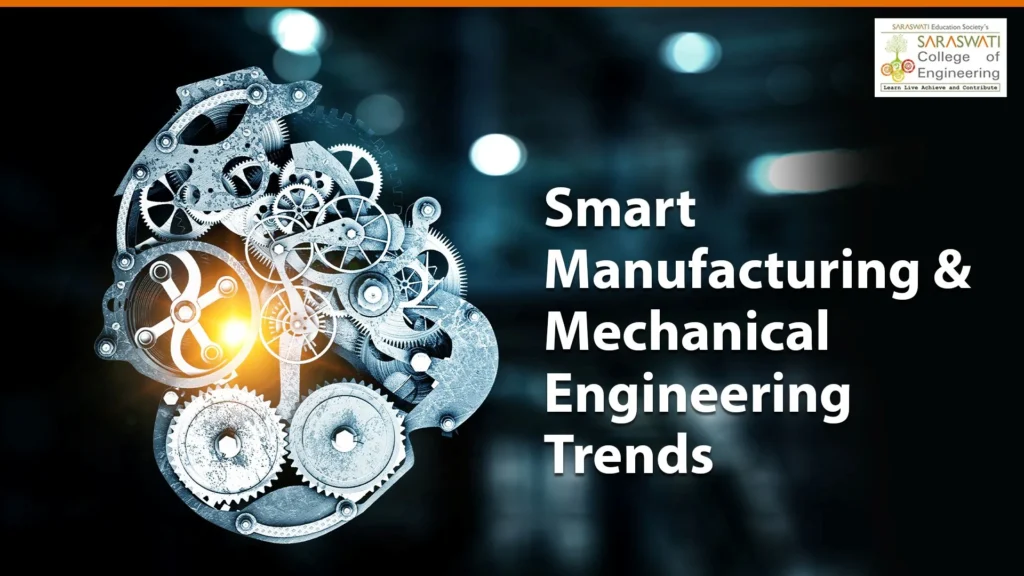Industry 4.0 and Smart Manufacturing for Mechanical Engineers

Industry 4.0 and Smart Manufacturing: What Mechanical Engineers Need to Know
With rapid and dynamic technological advancements, the world of manufacturing has seen a massive transformation. Today, it’s not just about industries running large-scale production units, it’s about how smart, efficient, and innovative they are. From the steam engines of the First Industrial Revolution to the mass production era of the Second Industrial Revolution, and the rise of Information Technology during the Third Industrial Revolution, each phase has completely changed the way engineers, especially in mechanical engineering, think, design, and build products. These changes have shaped how modern factories work, making them faster, smarter, and more connected than ever before.
As we progress further, we are now witnessing the emergence of Industry 4.0, an era powered by innovative technologies that blur the line between the physical and digital worlds. The transformation is essentially the concept of smart manufacturing, which represents a fundamental shift in how factories operate, and it has profound implications for mechanical engineers.
The pace of technological changes has accelerated since traditional roles have evolved. Therefore, upcoming mechanical engineers need to equip themselves with the trending technologies to stay relevant. This blog dives into the ocean of Industry 4.0 and smart manufacturing to give you an idea of what you need to know to thrive in the industry.
What is Industry 4.0?
Industry 4.0 refers to the fourth industrial revolution with emphasis on the advent of intelligent factories with self-optimizing systems, real-time decision-making, predictive maintenance, customization, and flexibility in production. Industry 4.0 represents a thoughtful convergence of cyber and physical systems, creating ‘smart’ factories where machines, sensors, and humans work together and communicate with one another in real-time.
At the forefront of Industry 4.0 are several breakthrough technologies:
- Internet of Things (IoT): Sensors within devices gather data to be analyzed and used in making smart decisions or initiating actions independently.
- Big Data and Analytics encompass vast amounts of data gathered from machines, production lines, and even consumers, which serve to uncover inefficiencies, anticipate failures, and enhance performance.
- Cyber-Physical Systems (CPS): Physical processes are controlled and supervised by computational algorithms within such systems. Some examples include automated assembly lines and robotic assembly systems.
- Cloud Computing: Enables data to be stored and computed centrally, and accessed from anywhere and collaborated upon.
- Artificial Intelligence (AI) & Machine Learning: AI environments learn through experience to make decisions, recognize patterns, and enhance processes with minimal human intervention.
- Advanced Robotics: Collaborative robots (cobots) assist their human colleagues, facilitating flexibility and productivity on the factory floor.
Combined, these technologies are remaking the future of manufacturing, enabling factories to be innovative, agile, and efficient in ways never before possible.
What’s Smart Manufacturing?
Smart manufacturing refers to the implementation of Industry 4.0 concepts in the manufacturing process. It integrates smart devices, digital platforms, and data-driven decision-making to optimize all areas of manufacturing.
Instead of operating every segment of the manufacturing line as a silo, smart manufacturing enables real-time communication and coordination among machines, systems, and human labourers. This connectivity is the basis for greater responsiveness, efficiency, and customization.
Some Examples of it:
- Adaptive Manufacturing: Production lines adjust automatically in response to changing demand or material availability.
- Digital twins are computer representations of physical assets, used to model their operation, test for improvements, and predict future behavior under changed conditions.
- Predictive Maintenance: Instead of following a strict service calendar, intelligent systems analyze machine data to predict failures in advance, saving downtime and maintenance costs.
The ultimate objective of smart manufacturing is to produce an auto-optimizing production process that continually learns, enhances, and improves productivity and innovation.
The Role of Mechanical Engineers in Industry 4.0
The role of mechanical engineers is no longer limited to creating physical components; it has expanded to encompass a broader range of responsibilities. In Industry 4.0, they must know how their mechanical systems communicate with software, data, and automation technologies.
The careers of mechanical engineers have undergone significant changes.
Moving from Isolated Design to System Integration: Engineers are required to create products and systems that interact with digital interfaces, sensors, and data feedback loops.
Collaboration with Cross-Functional Teams: Mechanical engineers are increasingly collaborating with data scientists, software developers, and IT professionals to develop integrated systems.
Engineers are motivated to utilise data to enhance the performance of machinery, reduce energy consumption, and facilitate flexible manufacturing approaches.
Places Where Mechanical Engineering Remains Applicable:
- Sensor Location: To effectively locate sensors, expertise in vibrations, fluid flow, and thermodynamics is required, ensuring they can capture valuable information.
- Material Selection and Structural Integrity: Without a strong physical body, even the finest analytics amount to nothing.
- System Modelling and Simulation: Mechanical engineers apply their fundamental knowledge of control systems and dynamics to simulate how smart machines will respond under actual conditions.
An excellent case in point is the role of mechanical engineers in autonomous robotic arms. The control systems can be digital, but the engineers’ knowledge is crucial in designing the structure of the arm, knowing its kinematics, making it load-carrying capable, and predicting potential failure modes.
Skills Mechanical Engineers Must Develop:
Data literacy is essential; it encompasses the ability to gather, interpret, and act upon data. This skill set includes reading sensor output, interpreting dashboards, and using data to improve designs.
Programming and Scripting: While not required, familiarity with Python, MATLAB, or R is necessary, along with a basic ability to code for automation, hardware interfacing, and API interfacing.
Software and computing platforms, including Digital Twin Platforms, Product Lifecycle Management (PLM) products, and smart CAD products that incorporate simulation and cloud connectivity, are transforming how engineers design, test, and govern products.
Interdisciplinary Collaboration: Mechanical engineers are more often working alongside teams of electrical, software, and data engineers. To be effective on integrated, cross-functional projects, an elementary understanding of networking, cybersecurity, and cloud architecture is now essential.
Range of Mechanical Engineering in the Industry 4.0 Era
The discipline of mechanical engineering is not shrinking; it is expanding. With automation handling the repetitive tasks, the need for engineers keeps rising for:
- Creating smart machines
- Integrating mechanical parts with sensors and software.
- Improving energy efficiency and encouraging sustainability.
- Designing hybrid human-robot workflows
In India, initiatives such as Make in India, Digital India, and Production Linked Incentives are motivating industries to modernise, thereby creating an enhanced demand for smart manufacturing skills. The mechanical engineers who are open to change will be at the forefront of this national transformation.
Trends in Mechanical Engineering in India
India is adopting Industry 4.0, particularly in automotive, aerospace, electronics, and heavy industry. Some of these key trends are:
- Smart factories are located in tier-1 cities such as Pune, Bangalore, and Chennai.
- The combination of robotics and 3D printing.
- Government push towards Industry 4.0 training.
Prominent Indian engineering colleges are revamping their syllabi to incorporate AI in mechanical engineering, IoT in manufacturing, and sustainable product design. Startups are also foraying into new sectors such as low-cost automation and AI-based machine diagnostics.
Challenges and Opportunities
Challenges:
- Skill Gaps: Many engineers were trained before digital fluency was emphasised in the curriculum.
- Legacy Infrastructure: Replacing old hardware with intelligent systems is expensive and complicated.
- Security Threats: Interconnected systems are prone to threats, necessitating strong security measures.
Opportunities:
- Career Progress: Industry 4.0-trained engineers are in great demand across all sectors.
- Sustainability: Intelligent systems can help reduce waste, conserve energy, and enable ecologically responsible manufacturing objectives.
- Entrepreneurship: Intelligent technology creates opportunities for startups that provide niche manufacturing solutions or develop intelligent devices.
Mechanical engineers are in the best position to lead if they embrace both the technological and cultural innovations brought about by Industry 4.0.
Future of Mechanical Engineering
The future of mechanical engineering is interdisciplinary and digitally enabled. Although there will be automation of some functions, the role of the human engineer in decision-making, creativity, and design innovation cannot be imitated.
In the coming years, mechanical engineers will have to:
- Create adaptive systems.
- Be a leader in sustainable engineering.
- Utilize AI tools in your daily life.
The Best Mechanical Engineering Institute
The best institute for mechanical engineering is the Saraswati Mechanical Engineering Institute. Opt for this B.E. in Mechanical Engineering from Saraswati College of Engineering (SCOE), Mumbai, and enjoy a strong foundation in fundamental mechanical concepts, hands-on exposure to state-of-the-art labs, and industry-oriented project experience.
With industry-veteran faculty, incorporation of smart manufacturing, and Industry 4.0-aligned curriculum, SCOE ensures all-round growth and real-world readiness. Students enjoy excellent placement with companies such as Tata Motors, ABB, and Honeywell, as well as R&D experience and career opportunities in the automotive, aerospace, energy, and robotics sectors. Reasonable fees, industry partnerships, and extensive alumni network make SCOE a go-to institution for India’s future-ready engineers.
Conclusion
Industry 4.0 and smart manufacturing are not buzz terms in the technology sector; they are indeed revolutionizing jobs, workflows, and the future of engineers. For mechanical engineers, especially in rapidly developing economies like India, the time of unprecedented opportunity has arrived. By creating the right skills and the right attitude, mechanical engineers can not only stay relevant but also rise to leadership positions in the new industrial age. This integration of digital brains with physical machines is the next big thing, and mechanical engineers are at the very heart of this revolution.
For individuals aspiring to lay down a strong and forward-looking career in mechanical engineering, Saraswati College of Engineering in Mumbai provides the ideal platform. With its stringent academic program, industry-relevant training, and unwavering commitment to student success, SCOE enables you to become a leader in the field of engineering innovation.
Ready to Upskill? Your Smart Manufacturing Future is Here. Discover More about SCOE.


